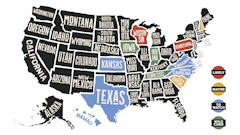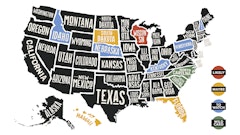
UPDATE: On May 30, the New Hampshire House voted, 252-117, against concurring with the Senate's amended version of House Bill 1633, and then the body voted, 261-108, to nonconcur and form a conference committee for the adult-use legalization legislation in an effort to resolve differences between the two chambers.
New Hampshire is on the verge of becoming the 25th state in the U.S. to legalize adult-use cannabis and the first to do so in 2024.
This potential halfway benchmark for the 50-state nation comes as the New Hampshire Senate voted, 14-10, on May 23 to approve an amended version of House Bill 1633.
The bipartisan-backed bill, which includes six Republicans and three Democrats signed on as sponsors in the originating lower chamber, would establish a regulated and taxed adult-use marketplace. The House’s version aims to allow those 21 years and older to purchase and possess up to 4 ounces of cannabis flower, 10 grams of concentrate or 2,000 milligrams of THC from any of 15 licensed dispensaries in the state, according to the bill. The Senate’s version was amended to reduce the first of these three possession limits to 2 ounces of cannabis.
Some of the other amendments by the upper chamber include:
- creating a state-run “franchise model” for dispensaries (more on this later);
- increasing the penalty from a violation to a misdemeanor for the unlawful sale of cannabis to a minor or for consuming cannabis in a motor vehicle;
- setting a THC limit of 10 milligrams for individual edibles and 200 milligrams per package;
- ensuring at least five cultivation licenses are awarded to independent growers with experience in New Hampshire agriculture;
- establishing a Cannabis Control Commission to approve rules and regulations; and
- moving the effective date for adult-use possession to Jan. 1, 2026, to coincide with the opening of retail stores.
Senate President Jeb Bradley, R-Wolfeboro, who voted against the bill, offered many of the amendments that prevailed in the chamber.
One amendment that failed May 23 on the Senate floor would have allowed adults 21 and older to begin possessing cannabis as soon as the bill became law, aligning with the House’s version of the legislation.
“If you want to give the black market an absolute heads up with diminishing quality of the product and put a New Hampshire retail business, cultivation business, at risk, then vote for this amendment,” Bradley said.
Later in the floor discussion and right before the vote, Bradley said, “Whether you’re going to vote for this bill or whether you’re going to vote against it, I think the fact that we’re able to collegially collaborate with each other, talk to each other, have give-and-take, we have done the right thing in terms of making a much better bill. And that’s a good thing.”
With the Senate’s amendments, the legislation must go back to the House for concurrence, or possibly to a conference committee to settle differences between the two versions of the bill, before being sent to Republican Gov. Chris Sununu’s desk.
While it’s far from a done deal, New Hampshire’s reform effort resembles a potential inflection point for the nation: Among 24 states to legalize adult-use cannabis, nine have done so through the legislative process. In those nine states, Democrats controlled majorities in both the statehouses and senates at the time of reform. Only one state, Vermont, had a Republican governor in office.
With a political trifecta in New Hampshire, where Republicans control both chambers of the legislature and the governorship, the “Live Free or Die” state could become a GOP guinea pig for adult-use cannabis legalization. Republicans have a 14-10 majority in the Senate and a 201-193 majority in the House.
But would other conservative state dominoes fall with New Hampshire’s lead?
Among the 26 states without adult-use cannabis legalization, 24 have Republican-controlled legislatures, with the exception of Hawaii and Pennsylvania. And of those 24 states, 14 do not provide for citizen-initiated ballot measures, meaning it’s mainly up to GOP lawmakers to initiate reform. These 14 states include Alabama, Georgia, Indiana, Iowa, Kansas, Kentucky, Louisiana, New Hampshire, North Carolina, South Carolina, Tennessee, Texas, West Virginia and Wisconsin.
Although New Hampshire is the closest it’s been to ending cannabis prohibition for those 21 and older, the possibility of derailment remains for H.B. 1633, particularly with Sununu—an outgoing governor—laying out certain conditions for the legislation to meet to avoid his veto pen.
New Hampshire House lawmakers passed their version of the bill in a 239-141 vote in February, but they veered from one essential gubernatorial requirement: a state-run franchise model in which dispensaries would be independently owned but regulated in a fashion where the state’s Liquor Commission would be the franchisor and in control of certain aspects of each operation.
Before that vote, Rep. Erica Layon, R-Derry, one of the bill’s sponsors, said she feared such a model would not have the transparency needed for public trust.
“I think that when we set up a system like this, public trust is the most important thing that we need to keep,” she said during a committee meeting in February. “And then nobody’s wondering why a particular operator got the license.”
House lawmakers passed a similar version of the legislation last year that did not include a 15-dispensry license cap or a state-run retail model, but their peers in the Senate rejected the 2023 legalization attempt last May.
The day after that rejection, Sununu released a statement outlining his requirements for future legislation and acknowledging that New Hampshire is the only state in New England where adult-use cannabis is not legal.
“Knowing that a majority of our residents support legalization, it is reasonable to assume change is inevitable,” the governor wrote. “To ignore this reality would be shortsighted and harmful. That is why, with the right policy and framework in place, I stand ready to sign a legalization bill that puts the state of NH in the driver’s seat, focusing on harm reduction— not profits.”
Although the 2024 New Hampshire Senate has been more receptive to cannabis reform, amendments made in the upper chamber this month could represent a dealbreaker for many House Democrats.
Specifically, the Senate’s inclusion of the state-run franchise model for cannabis retailers is seen nowhere else in the nation among the 24 adult-use states. This model in New Hampshire would largely mirror that of the state’s liquor program and would require a franchise fee of 15% of a dispensary’s monthly total gross revenue from sales of cannabis and cannabis products but exclude the sale of cannabis accessories.
“I already know of 50 Democrats who are going to nonconcur, and I think that’s the tip of the iceberg,” Rep. Anita Burroughs, D-Bartlett, told the New Hampshire Bulletin earlier this week. Burroughs is one of the three House Democrats sponsoring the legislation.
Burroughs also took issue with the Senate’s version granting broad enforcement powers to the Liquor Commission, the news outlet reported.
During Thursday’s Senate discussion, Sen. Regina Birdsell, R-Hampstead, who voted against the legislation, warned her colleagues about the potential ramifications of legalization, including what she believes would be a negative impact on youth as well as the liabilities of a state-run model.
“If anything happens to these kids, the state is going to be criminally and civilly liable,” she said, referring to an opinion by New Hampshire Senior Assistant Attorney General Myles Matteson. “Franchises are regulated at the federal level, so the commission may need to take a deeper look at the potential issues surrounding that. … The uniqueness of the proposed franchise model in New Hampshire would be one of the reasons U.S. DOJ would choose to go after the state. Unique systems create unique liabilities.”
Georgia’s intent to allow pharmacies to sell medical cannabis is an example of a unique approach to legalization that has not worked out: The U.S. Drug Enforcement Administration sent a notice in December to Georgia pharmacies, reminding them that they are registered under the federal government, and the state’s regulators have since postponed this approach.
New Hampshire Sen. Cindy Rosenwald, D-Nashua, who voted in support of H.B. 1633, said change can be difficult, yet some of the fears for cannabis legalization have not turned into realities in the 24 states that have already legalized adult-use cannabis.
“The much-feared increase in youth use has not happened,” she said, citing a peer-reviewed study published last month in JAMA Psychiatry, in which researchers analyzed youth risk behavior from 1993 to 2021 and found that teen cannabis use did not increase in states that legalized adult-use cannabis compared to states that did not.
“Legalization is not without potential risk,” Rosenwald said. “I’m confident that we have tightened up our regulatory structure with a focus on public health and safety and minimal representation from industry on the Cannabis Control Commission so that we will apply the lessons learned from the experience of other states.”
The big question now is whether New Hampshire’s House will adopt the Senate’s changes, or if lawmakers between the two chambers can reach an agreement in committee.

























